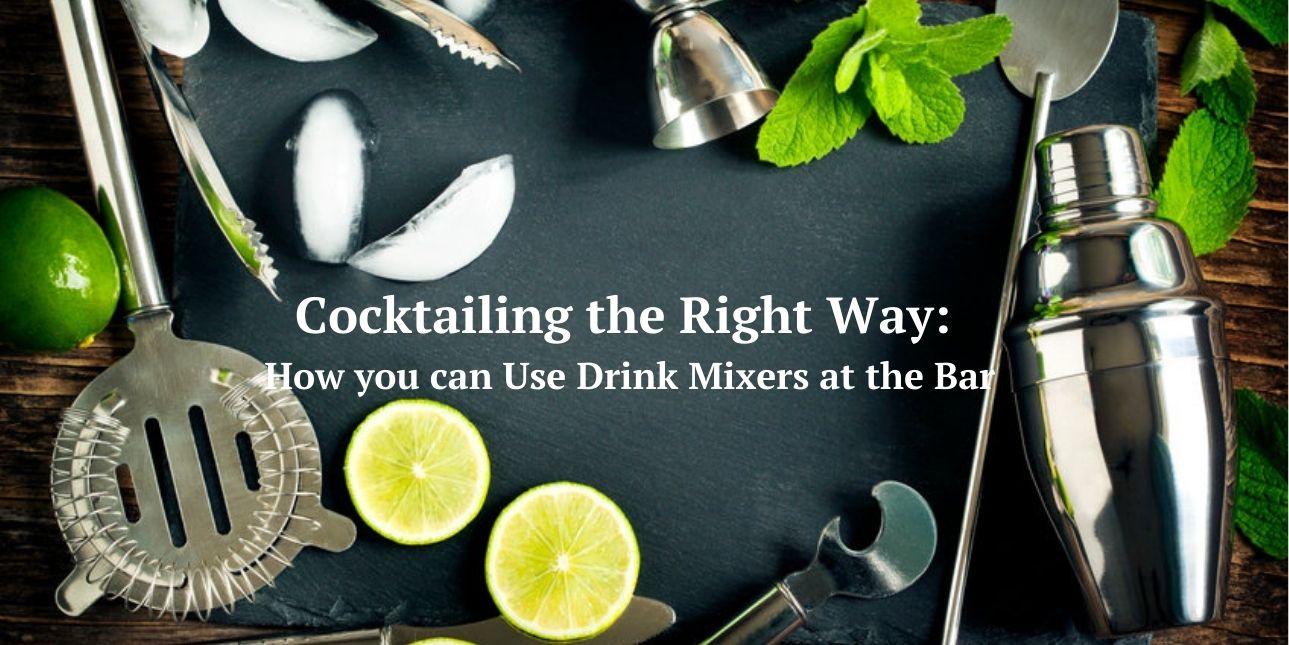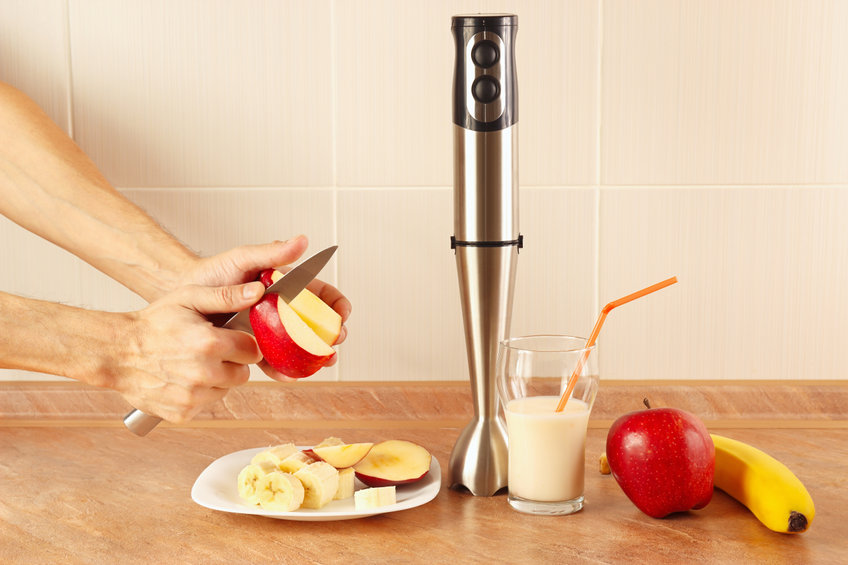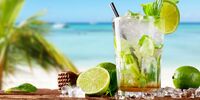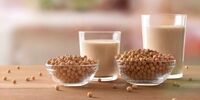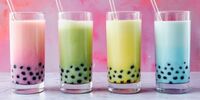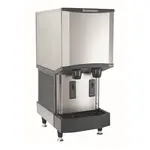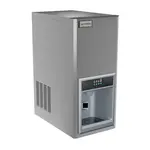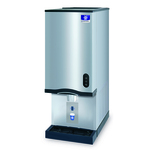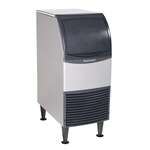The culinary space would be grossly incomplete without beverages. Whether alcoholic or non-alcoholic, beverages truly enrich the experience of food and it's important to offer quality drinks to your customers. Drink mixers refer to a couple of things in the world of mixology. The more obvious would be the electric drink mixer that allows you to whip up a large volume of drinks, shakes, cocktails, and batters. However, mixers also refer to a large variety of additives, condiments, and liquids that can be added to alcohol to create drinks and cocktails worth relishing.
'How to use a mixer?' and 'how to mix a drink?' are fairly common questions at the bar, considering novices and other staff are usually unfamiliar with the terms. However, both the electric mixer and drink mixers come in handy while running a bar and serving a large number of guests. We discuss how to use a drink mixer, how these tools can offer diversity to your drink menu, and the various drinks you can prepare. Knowing what a mixer is can open up the world of mixology, allowing you to bring in a lot of profits through the bar.
What's an Electric Drink Mixer?
Electric drink mixers are ingenious tools that can help you prepare beverages. Not merely limited to alcoholic cocktails and drinks, you can also deploy an electric drink mixer while whipping up batters for breakfast. These devices are also used for creating a smooth and creamy milkshake - the reason why they're also called milkshake mixers. Even omelet slurries give fluffier and more fulfilling results when mixed with a drink mixer.
How to use an electric drink mixer depends on what functionality you intend on using. At the bar, drink mixers are essential in helping you concoct and blend several ingredients into the various cocktails.
The agitators help bring together the various solid and liquid ingredients irrespective of their weights and densities into a uniform consistency. Though powerful, they're unable to blend ice into the mix. So, it must be noted that ice from a commercial ice maker must be added to cocktails made by electric drink mixers at the end. Be sure to include electric drink mixers in your underbar equipment buying lists to maximize your bar's output.
What's a Mixer?
Merely alcohol won't make the cut for customers that come looking for something more with each drink. Mixers add a full spectrum of tastes, scents, effervescence, and even textures to each drink when mixed with liquor. Mixers are non-alcoholic and often readily available components you can add to your bar's offerings. This makes them far more interesting and introduces your guests' palates to a whole new range of experiences. While ideal when paired with a liquor of compatibility, mixers also double up as offerings in themselves at the bar, helping you provide for guests that choose to remain sober for the night. Here are some common mixers used by mixologists all the time:
Cola (both diet & conventional)
Soda
Tonic water
Lemon zest & juice
Fruit juices
Ginger ale
Ginger beer
Lemon & citrus sodas
Apple cider vinegar
Milk and cream
How to Use a Mixer
A basic knowledge of how to mix a drink and having the essential mixers and alcohol can help you prepare a large list of drinks. Here are some common mixers and how you can use them from our very own drink mixer guide:
Cola
Regular cola is a favorite among several bartenders since it blends so well with such a large number of liquors. Cola, whether regular or diet, adds sweetness, effervescence, and taste to the cocktail. Bringing together familiar tastes to the drink, you can use cola to make a variety of drinks. It is especially suited to drinks with a sweet taste profile, which includes rum, whiskey, red wine, and even brandy. Here are some delicious drinks waiting to be made with cola:
Rum & Coke or Cuba Libre
Long Island iced tea
Jack & Coke
Rioja Libre
Coke floats
Sparkling or Carbonated Water
Carbonated water is one of the best ways to dilute and mix drinks. It's plain, tasteless, and incorporates effervescence into the drinks it's mixed with. For drinks that have been mixed too strongly and are concentrated, it is the perfect additive to draw out and mellow the flavor to make the drink palatable. The neutral profile allows carbonated water to be added to practically any drink that demands it, and is one of the ideal examples of a mixer. Some popular drinks that include soda are:
Gin Rickey
Vodka Rickey
Vanilla bourbon
Virgin mojito
Cuban mojito
Tonic Water
Tonic water contains a variety of sweeteners, carbonated water, and quinine to give it a bitter after-taste. It engages more taste buds than the regular club soda and cola. Tonic waters can contain either natural sugars or artificial sweeteners to even out the taste. However, the bitter blend with drinks like vodka, tequila, and gin can bring out the drink's taste in a more unabashed manner. Common cocktails regularly made with tonic water include:
Gin & tonic
Vodka & tonic
Tequila & tonic
Rum & tonic
Bourbon lemon tonic
Vermouth & tonic
Lemon Zest & Juice
Lemon juice and zest are the ideal examples of citrus taste mixers. With a sharp & sour taste, topped with the classic scent of lemon, the mixer works perfectly with several varieties of liquor. The scope of usage of this mixer is endless due to its extensive popularity. Some popular drinks with lemon juice and zest are:
Lemon drop cocktail
Mojito
Lemon margarita
French 75
Citrus tequila cocktail
Fruit Juices
Adding natural tastes to liquors can be a great way to approach customers. Fruit juices are a great take on how to use mixers. Banking on familiarity, coupled with the taste profiles of various spirits can result in a very diverse set of drinks. Here are a few popular drinks with fruit juices:
Tequila sunrise
Tropical paradise
Passion fruit hurricane
Rum punch
Sea breeze
Fruit Mojito
Ginger Beer & Ale
While ginger beer is a fermented ginger drink, ginger ale on the other hand is carbonated water with an added hint of ginger. The former has a stronger influence of spice and is one with more natural taste profiles of ginger. However, both of these ingredients are ingenious methods answering the question - how to mix a drink? Here are some favorites:
Moscow mule
Ginger Shandy
Gin & ginger ale
Grumpy old man
Morgan mule
Lemon & Citrus Sodas
Citrus-flavored carbonated water is a great additive to many cocktails. One of the more modern approaches on how to use a drink mixer, you can add citrus sodas to several liquors. They especially pair well with drinks that have a sharp taste to them. Here's what you can offer with citrus sodas:
Citrus coolers
Orange crush cocktail
Rum & Citrus Cooler
Passion Fruit Vodka
Citrus Gin Spritzer
Apple Cider Vinegar
Apple cider vinegar is derived by fermenting apple extract and juice. It has natural sugar remnants and contains no additional additives. Remarkable for its acclaimed health benefits, it also can be coupled with several alcoholic beverages to give you several classic cocktails. Some of them include:
Apple cider whiskey punch
Apple cider bourbon
Apple cider martini
Apple cider & rum
Cinnamon Crush with apple cider
Milk & Cream
Nothing beats classic dairy when it comes to enriching taste. Milk and cream offer a stable base for other mixers and beverages to even out, giving the drink a homogenous feel. Milk and cream are popular drink mixers, and here are some delicious offerings that have them in the mix:
White Russian
Coconut margarita
Milk & honey cocktail
Jamaican milk punch
Dominicana
There are several ways on how to use a mixer and how to mix a drink. You have a large list of choices that you can select to add to your bar's list of ingredients, so you have a diverse drink menu. Also, consider referring to a bar equipment buying guide before outfitting your establishment, this will help you expand on positive returns and happy customers.

